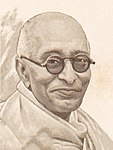|
Swatantra Party
The Swatantra Party was an Indian classical liberal political party that existed from 1959 to 1974. It was founded by C. Rajagopalachari[13] in reaction to what he felt was the Jawaharlal Nehru-dominated Indian National Congress's increasingly socialist and statist outlook.[2] The party had a number of distinguished leaders, most of them old Congressmen, like C. Rajagopalachari, Minoo Masani, N.G. Ranga, Darshan Singh Pheruman,[14][15] Udham Singh Nagoke[16] and K.M. Munshi. The provocation for the formation of the party was the left turn that the Congress took at Avadi[17] and the Nagpur Resolutions. Swatantra stood for a market-based economy and the dismantling of the "Licence Raj" although it opposed laissez-faire policies. Swatantra was not a religion-based party, unlike the Hindu nationalism of the Bharatiya Jana Sangh. In 1960, Rajagopalachari and his colleagues drafted a 21-point manifesto detailing why Swatantra had to be formed even though they had been Congressmen and associates of Nehru during the struggle for independence.[18][better source needed] Prime Minister Jawaharlal Nehru was highly critical of Swatantra and dubbed it as belonging to "the middle ages of lords, castles and zamindars".[19] History
In ParliamentN.G.Ranga rebuked the Nehru government for being ill-prepared in defence on 8 November 1962 in a speech during parliamentary debate.[20] Minoo Masani, the party MP from Rajkot, voiced his opposition to the bank nationalisation bill by Indira Gandhi's government on 25 July 1969.[21] Electoral historyIn the 1962 general election, the first after its formation, Swatantra received 7.89 percent of the total votes and won 18 seats in the third Lok Sabha (1962–67). It emerged as the main opposition to the dominant Congress in four states: Bihar, Rajasthan, Gujarat and Orissa. By the next general election in 1967, Swatantra had become a significant force in some parts of India; it won 8.7 percent of the votes and became the single-largest opposition party in the fourth Lok Sabha (1967–71) with 44 seats. In 1971, Swatantra joined a "Grand Alliance" of parties from across the political spectrum that aimed to defeat Prime Minister Indira Gandhi. The party secured eight seats by winning 3% of the votes. The next year, in 1972, its founder, Rajagopalachari, died, and Swatantra declined rapidly. By 1974, it had dissolved, with many of its members joining the Charan Singh-led Bharatiya Lok Dal.[citation needed]
State legislative assembly electionsOdisha
Rajasthan
IdeologyFundamental principlesFirst and foremost, the Swatantra Party committed to social justice and equality of opportunity of all people "without distinction of religion, caste, occupation, or political affiliation".[26] The party felt that progress, welfare and happiness of the people could be achieved by giving maximum freedom to individuals with the state minimising intervention. The state should replace its intervention with fostering the Indian tradition of helping other people directly.[26] In particular, the party believed that the state should adhere to the Fundamental Rights guaranteed by the Constitution of India and, in particular, should compensate individuals if their property had to be acquired for public purposes. It also believed in giving citizens full freedom to educate their children as they wanted.[26] It recognised the need for increasing food production and sought to do so by giving peasants full land rights and incentives for increasing production in agriculture.[26] In industry, it sought to reduce state presence only to the minimum necessary to supplement private enterprise and in national services like the Indian Railways. It sought to do away with controls on trade and commerce. However, it committed against unreasonable profits, prices and dividends. It believed in placing equal emphasis on the development of capital goods industries, consumer goods industries and rural and small industries.[26] In the fields of taxation and state expenditure, it believed in thrift and called for taxation to suffice for carrying on of administration and social and economic activities taken upon by the state but should not depress capital formation and private investment. The government should also desist from running abnormally large deficits or taking foreign loans that are beyond the capacity of the country to repay. In particular, it resisted unnecessary expansion of the bureaucracy.[26] While standing for minimising state intervention in the economy, the Swatantra Party committed to securing a fair deal for labour, correlating wages to increased productivity and workers' right to collective bargaining.[26] It also gave their members full freedom to question and criticise any point not included in the fundamental principles of that party.[26] OthersParty's fundamental principles had not covered several issues like foreign policy, national language, state reorganisation and religious and social reform.[27] The party was generally opposed to communism and in 1969, urged the Indian government to ban the three major communist parties in India at that time, the CPI, CPI(M) and the Naxalites, because of their open or tacit support for armed struggles, which the Swatantra Party viewed as a major security threat to the nation.[28] In foreign affairs, it opposed non-alignment and a close relationship with the Soviet Union and advocated an intimate connection with the United States and Western Europe.[28][27] Decline and legacyIn 1969, the Congress party split, leading to consolidation of right-leaning votes under Congress (O). This proved detrimental to the electoral prospects of the Swatantra party.[29]
By 1971,the Swatantra party had disintegrated due to infighting and changed political scenarios.[30] See also
NotesReferences
Sources
External links
|
||||||||||||||||||||||||||||||||||||||||||||||||||||||||||||||||||||||||||||||||||||||||||||||||





